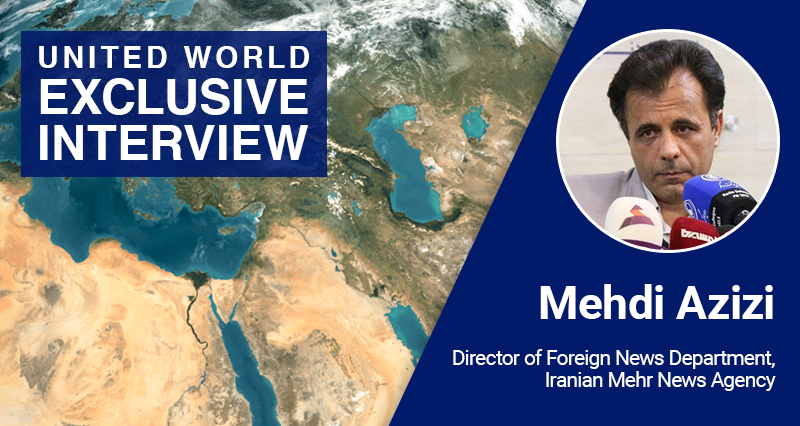By Roya Fereyduni
Mehdi Azizi, Iranian Mehr’s foreign news agency director claimed, “By attacking Syria, the Zionist regime is trying to recompense and regain it’s now lost self confidence against their defeats from the Hezbollah and resistance groups”.
Mehdi Azizi evaluated the developments in the region in an interview he gave to United World International.
It is said that interactions between Ankara-Damascus has begun. Do you have any information about these claims, how do you evaluate it?
Interactions between Ankara-Damascus began a few months ago. The reason is that Turkey has accepted has accepted to have made miscalculations and pursued wrong policies concerning regional developments. On the other hand, Turkey is facing economic problems, with the Turkish lira’s loss of value.
The deployment of Turkey’s military to Idlib, the Syrian border and to areas of high-tension also creates problems for Ankara. For these reasons, Turkey has to reconsider its policies.
I think this is a possible tactic and that it may not currently be sustainable.
There has been repeated air strikes of Israel against Syria. It is reported that groups close to Iran have been hit in these attacks. How do you evaluate these claims?
The axis of resistance in Lebanon, Syria and Iraq follows the discourse of Islamic resistance and that of Tehran. Therefore, it is natural to evaluate any attack on the Syrian-Lebanese-Iraqi axis of resistance as an attack on groups close to Iran. Of course, the Zionist regime pretends that these attacks had nothing to do with Syria or Lebanon and instead were targeting Iranian interference. But this is not true. Essentially, these attacks are not related to groups close to Syria or Iran.
With such attacks, the Zionist Regime attempts to regain the trust from the Jewish community by distracting the public from their internal problems.
The regime is attempting to redeem its defeats against the Hezbollah and the resistance groups and to make up for their self-confidence with these attacks.
The UAE and the Gulf countries are taking steps to normalize relations with Syria. How do you evaluate these steps?
This is essentially happening because the calculations on the Syrian crisis were proven wrong after 10 years.
They had predicated the crumbling of Syria’s government within months when the crisis started. They had counted on Syria’s division and later on the Trump Administration. During Biden’s time, the hope of Arabic countries has risen even more.
Regional countries have acknowledged miscalculations concerning Syria
But today, these countries have come to realize that there is no other option but to change policies fundamentally back to how they were before.
Some media institutions claim that their countries received concessions from Syria within the context of that country’s return to the Arab League and their own steps towards Damascus, thus justifying their policy change.
This all shows us that they regret their former policies and are forced now to change course.
Political pressure, the change of US regional politics, Washington’s retreat from Afghanistan, Turkey’s wrong approaches and the UAE’s troubles in Yemen are the factors that caused this change.
How do you evaluate the effectiveness and future of the Astana mechanism?
Tehran is open to any peaceful solutions to settle crises. Tehran’s role is very important and crucial, even in the situation where such political processes deliver negative experiences and America is trying to block a solution that can be achieved in a political process.
The UAE feels it cannot trust the U.S.
UAE officials visit Turkey, Syria and Iran. How do you evaluate the UAE’s diplomatic opening?
The UAE visits Turkey, Iran and Syria results from their concerns in regard of their own currently unstable situation. They felt they couldn’t trust the Americans and the Saudis. We saw that in Yemen there are conflicts between the UAE and the Saudis too.
On the other hand, the UAE considers that it needs to use other trump cards as well, especially concerning Iran and Syria.
The UAE’s concerns result in great part from current US policies, but on the other hand, they also think that situation does not evolve according to the American-Saudi plans.

















Leave a Reply